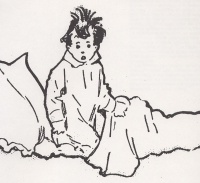When we were children, there was a joke about three boys sitting in a boat. One was called biteme, another one pinchme and a third hitme.
Hitme fell out of the boat. Who remained in the boat?
You can guess what happened next.
In Rabelais and His World, Bakhtin describes a somewhat similar word game.
A 13th century medieval monk searched all biblical and patristic texts for sentences containing the word nemo, Latin for nobody.
He then interpreted phrases such as “nemo deum vidit” (“Nobody has seen God”), along with many other references to nobody, to mean that Nemo referred to a proper noun and thus was a certain person and that the phrase actually meant “Saint Nobody has seen God”.
That text, known as the “History of Nemo“, is now lost, but its story is not and it is easy to see why it so fascinated medieval everyman.
Bakhtin remarks: “everything impossible, inadmissible, inaccessible is, on the contrary, permitted for Nemo. Thanks to this transposition, Nemo acquires the majestic aspect of a being almost equal to God, endowed with unique, exceptional powers, knowledge (he knows that which no one else knows), and extraordinary freedom (he is allowed that which nobody is permitted.)”
I am reminded of another childhood memory. I have younger brother who is called Joost. There is a Dutch expression which says “Joost mag het weten,” (literally “Joost is allowed to know [it]”) meaning “heaven knows” or “God knows” (nobody knows).
When we were children, many people used to say jokingly to my brother “Joost mag het weten.”
One day — apparently fearing that some big secret was being kept from me — I asked my mother. “Mother, when am I allowed to know it?”
PS 1. If you like these word games, I recently posted on the medieval nonsense word blituri[1].
PS 2. Nobody is also a subcategory of the void and a sister category of nothing. I recently mentioned the void [2].

